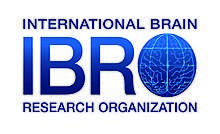International Brain Research Organization
The International Brain Research Organization (IBRO) is the global federation of neuroscience organizations that aims to promote and support neuroscience around the world through training, teaching, collaborative research, advocacy and outreach. More than 90 international, national and regional scientific organisations constitute IBRO’s Governing Council which, together with the five IBRO Regional Committees, address the needs and advance the work of individual scientists and research communities everywhere. In addition, IBRO has partnerships with like-minded scientific societies and organizations to identify priorities and help bridge gaps in knowledge, investment and resources in the field of brain research.
 | |
| Abbreviation | IBRO |
|---|---|
| Formation | 1961 |
| Type | International non-governmental organization |
| Headquarters | Paris |
Region served | Worldwide |
Official language | English |
President | Tracy L. Bale |
| Website | ibro |
History
IBRO was founded in 1961 in response to the growing demand from neuroscientists around the world for the creation of a central organization that would cut across world boundaries and improve communication and collaboration among brain researchers.[1]
The origin of IBRO can be traced back to a meeting of electroencephalographers in London in 1947, which led to the establishment of an International Federation of EEG and Clinical Neurophysiology. A later conference in Moscow in 1958 of IFEEG and other groups, successfully achieved unanimous support for a resolution proposing the creation of an international organization representing brain research worldwide.[2]
IBRO was established as an independent, non-governmental organization, regulated by a Governing Council. The organization represents the interests of circa 75,000 neuroscientists around the globe.[3]
Quadriennial meeting
In collaboration with neuroscience societies around the world, IBRO holds international congresses once every four years.
IBRO World Congresses:[4]
- Lausanne, Switzerland (1982)
- Budapest, Hungary (1987)
- Montréal, Canada (1991)
- Kyoto, Japan (1995)
- Jerusalem, Israel (1999)
- Prague, Czech Republic (2003)
- Melbourne, Australia (2007)
- Florence, Italy (2011)
- Rio de Janeiro, Brazil (2015)
- Daegu, South Korea (2019)
Presidents
IBRO Presidents:
- Hans-Lukas Teuber (1969-1971)
- Alfred Eugène Fessard (1971-1974)
- Walle Nauta (1974-1980)
- Masao Ito (1980-1984)
- Dominick P. Purpura (1984-1999)
- Torsten Wiesel (1999-2005)
- Albert Aguayo (2005-2008)
- Carlos Belmonte (2008-2014)
- Pierre Magistretti (2014-2019)
- Tracy Bale (2020-present)
Publications
- Neuroscience is the official journal of IBRO, published on their behalf by Elsevier.
- IBRO Reports is an open access journal published by Elsevier.
- Neuroscience: Science of the Brain is a booklet for older children and the general public. It aims to describe our current understanding of brain function. Each of the twenty chapters focuses on a different aspect of the brain and is written by leading neuroscientists in that field. It is available in over twenty languages.[5]
Honorary Members
- Carlos Chagas
- Herbert Jasper
- Ivan Solomonovich Beritashvili
- John Eccles
- Henri Gastaut
- Willem Storm van Leeuwen
- Klaus Unna
- Joaquín Luco Valenzuela
- Viktor Hamburger
- Liliana Lubińska
- Walter A. Rosenblith
- Theodore Holmes Bullock
- Walle Nauta
- Robert Naquet
- Derek Richter
- Torsten Wiesel
References
- Rockstad-Rex, Robynn; Magistretti, Pierre (2012). "An introduction to the International Brain Research Organization: IBRO's beginnings". Neurology. 79 (14): 1496–1498. doi:10.1212/WNL.0b013e31826d5fd7. PMID 23033503.
- Marshall, LH; Rosenblith, WA; Gloor, P; Krauthamer, G; Blakemore, C; Cozzens, S (1996). "Early history of IBRO: The birth of organized neuroscience". Neuroscience. 72 (1): 283–306. doi:10.1016/0306-4522(95)00558-7. PMID 8730725.
- "IBRO Members". Retrieved 25 January 2019.
- "IBRO World Congresses". Retrieved 25 January 2019.
- "Neuroscience: Science of the Brain". Retrieved 25 January 2019.